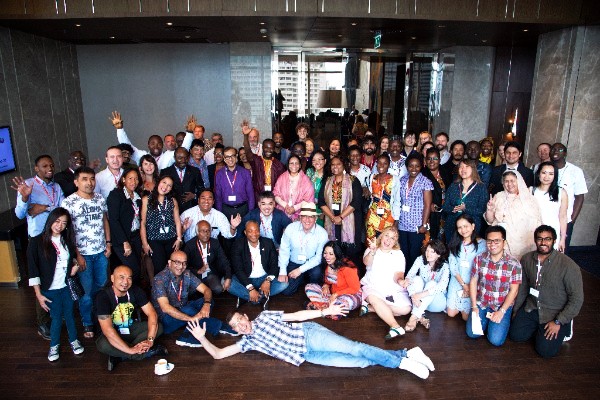
11 August 2017 - As we embark on the road to the United Nations High Level Meeting (UNHLM) on TB, the Stop TB Partnership, in collaboration with APCASO and Treatment Action Group (TAG), hosted a global meeting from 29-30 July, where more than 60 community and civil society advocates from 32 countries strategized on advocacy priorities promoting community-led, people-centered, rights-based and gender transformative approaches to end TB.
Given the unprecedented momentum towards ending the global TB crisis, highlighted by commitments by the G20 Heads of State, BRICS Ministers of Health, Global Ministerial Conference and the historical opportunity of the September 2018 UNHLM on TB, communities and civil society will further continue to mobilize, pushing their governments towards TB programs that are people centered, ambitious and bold, to achieve the 90(90)90 targets of the Global Plan to End TB, and to hold their governments and all stakeholders accountable on their commitments.
Dr. Lucica Ditiu, Executive Director of Stop TB Partnership noted, “It is time to do two things. First, we must be bold and strong in our vision. Second, we must be united and positioned around and for people affected by TB. As a TB community, we must band together, capitalize on the once in a life-time opportunity with the HLM on TB, bring TB in the minds and hearts of Heads of States and Governments and be ready to work for all people with TB.”
The convening in Bangkok offered a unique opportunity for communities and civil society actors to come together to identify, document and transform the challenges and needs of the missing, marginalized and those affected by TB into advocacy imperatives and strategies.
Two overarching themes were emphasized: financial and political support enabling communities to be central in all aspects of the TB response, including decision making processes; and, secondly, adoption of community-centered, rights-based and gender-transformative approaches at all levels, including in framework-setting and decision-making platforms, like the UNHLM and the Global Ministerial Conference.
Together, advocates agreed on a set of six “thematic priorities for action” to inform their advocacy on ending TB that will be key for the discussions and deliberations around the UNHLM as well.
1. Responsive and comprehensive systems for health to end TB
2. Scaled up, people and community-centered, rights based, gender transformative responses to end TB
3. Accelerated research and development to end TB
4. Highest standards of accountability and transparency to end TB
5. Adequate and sustainable domestic funding to end TB
6. Equity and access to information, commodities and services, to end TB
RD Marte from APCASO emphasized that, “these six priorities can guide our advocacy agenda – as a TB community. These priorities can be adapted and framed to the requirements of the Global Ministerial Meeting, the UN HLM on TB and any future forums for engagement ensuring a strong and coordinated community voice that resonates at all levels of the TB response.”
“As civil society and communities we need to be focused and determined. Without us at the forefront of this fight, holding our governments to account on their commitments we will never end this insidious epidemic,” said Timur Abdullaev, TB Affected Community Representative, Stop TB Partnership Coordinating Board.
To harness the momentum, key next steps have been agreed by community and civil society advocates. Firstly, position statements on each of the six-thematic area will be composed, endorsed and leveraged by the TB community to systematically and strategically inform and engage in national, regional and global dialogues and forums.
Secondly, regional and global roadmaps outlining critical points of engagement are now in development.
Thirdly, to ensure the constant and continuous presence and effective engagement of communities and civil society in dialogues and spaces leading to and at the UNHLM on TB, a resourced community advisory panel that fully represents, engages and empowers the grass roots is critical and ought to come into effect as quickly as possible.
“As community activists now is the time to be furious, loud and demanding. To end TB we are, and have to continue to be, united and ready to fight,” stated Lynette Mabote from ARASA.
Source: Stop TB Partnership